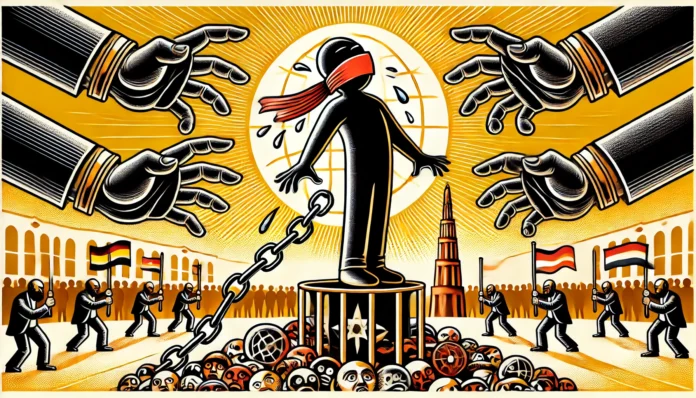Blasphemy Laws Under Fire: Global Fight for Free Expression
Across the globe, blasphemy laws continue to threaten the fundamental right to free expression, particularly for atheists, humanists, and nonbelievers. These laws, which criminalize criticism or perceived insults against religion, remain entrenched in dozens of countries, often carrying severe penalties including imprisonment, violence, and even death. In 2025, the movement to overturn these oppressive statutes has gained unprecedented momentum, with activists, human rights organizations, and governments pushing back against the chilling effect blasphemy laws have on open discourse and personal safety.
The Global Landscape: A Persistent Threat
According to the 2025 Humanists International report, blasphemy laws remain in force in over 80 countries. The report exposes not only the scale of these laws but also their devastating impact on individuals who dare to question or criticize religious dogma. In many regions, accusations of blasphemy are used as tools of repression, silencing dissent and targeting minorities, including atheists and secular activists.
In countries such as Pakistan, Iran, and Saudi Arabia, blasphemy charges can result in lengthy prison sentences or even capital punishment. The mere accusation is often enough to incite mob violence, forcing accused individuals into hiding or exile. The Freedom From Religion Foundation’s (FFRF) global report highlights dozens of recent cases where people have faced prosecution, violence, or social ostracism for expressing nonreligious views or criticizing religious authorities.
Recent Cases: The Human Cost of Blasphemy Laws
In 2024 and early 2025, several high-profile cases have drawn international attention to the dangers posed by blasphemy laws:
- Pakistan: In late 2024, a university student was sentenced to life imprisonment for allegedly making critical comments about religious figures on social media. The case sparked protests from human rights groups, who condemned the lack of due process and the use of blasphemy laws to suppress free speech.
- Nigeria: A prominent humanist activist remains in prison after being convicted of blasphemy in 2023. Despite international outcry, authorities have refused to overturn the sentence, highlighting the risks faced by nonbelievers in deeply religious societies.
- Iran: Several bloggers and social media users have been arrested and charged with blasphemy for questioning religious doctrine or advocating for secularism. Many have been subjected to harsh interrogations and denied legal representation.
- Bangladesh: Atheist writers and activists continue to face threats and violence from extremist groups, with little protection from the state. The murder of secular bloggers in recent years remains a stark reminder of the dangers faced by those who speak out.
These cases are not isolated incidents but part of a broader pattern of repression. The threat of blasphemy accusations extends beyond the courtroom, often resulting in vigilante violence, social exclusion, and forced migration.
Spain’s Push for Reform: A Beacon of Hope
While many countries cling to blasphemy statutes, others are moving toward reform. In January 2025, Spain announced plans to repeal its blasphemy law, joining a growing list of European nations that have recognized the incompatibility of such laws with democratic values. As reported by Reuters, the Spanish government’s initiative comes amid a broader debate over free expression and the need to protect secular voices.
Spain’s efforts are part of a wider trend in Europe, where countries like Ireland, Denmark, and Norway have already abolished blasphemy laws in recent years. These reforms send a powerful message to the international community: freedom of expression must take precedence over religious sensitivities.
Advocacy and the End Blasphemy Laws Campaign
At the forefront of the global movement to abolish blasphemy laws is the End Blasphemy Laws campaign, a coalition of humanist and secular organizations working to expose the harms caused by these statutes and to pressure governments for change. The campaign provides resources, tracks legal developments, and supports individuals facing prosecution.
Human rights advocates argue that blasphemy laws are fundamentally incompatible with international human rights standards, including the right to freedom of thought, conscience, and expression. The United Nations Human Rights Committee has repeatedly called for the repeal of such laws, emphasizing their discriminatory impact on religious minorities and nonbelievers.
The Impact on Nonbelievers and Free Expression
For atheists and secular activists, blasphemy laws represent a direct threat to personal safety and the ability to participate in public discourse. In many countries, simply identifying as an atheist can lead to harassment, job loss, or worse. The chilling effect of these laws stifles debate, discourages critical thinking, and perpetuates religious privilege at the expense of universal human rights.
Despite these challenges, nonbelievers and their allies continue to fight for change. Online campaigns, international advocacy, and grassroots organizing have brought global attention to the plight of those targeted by blasphemy laws. The growing movement for secularism and free expression is making it increasingly difficult for governments to justify the continued existence of these repressive statutes.
Looking Forward: The Road to Repeal
As the campaign to end blasphemy laws gains traction, the international community faces a critical juncture. Will governments uphold the right to free expression for all, or will they continue to allow religious sensitivities to override basic human rights? The answer will have profound implications not only for atheists and nonbelievers but for anyone who values open debate and the free exchange of ideas.
With continued advocacy, public pressure, and international solidarity, the hope is that more countries will follow Spain’s lead and consign blasphemy laws to history. The fight is far from over, but the momentum is on the side of those who believe that no one should be punished for questioning, criticizing, or rejecting religious beliefs.
For more information and ways to support the movement, visit the End Blasphemy Laws campaign and review the latest findings in the 2025 Humanists International report and the FFRF’s global report.

